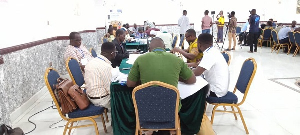 Some participants at the meeting
Some participants at the meeting
Dr. Charity Osei-Amponsah, Senior Regional Researcher at the International Water Management Institute (IWMI), has stated that the devastating impacts of climate change have presented an urgent need for resilience building.
Dr. Osei-Amponsah, who is also the Project Coordinator for the European Union (EU) funded Resilience Against Climate Change – Social Transformation Research and Policy Advocacy (REACH-STR), noted that it was in view of this that the project organized a two-day knowledge-sharing and validation workshop themed: “Social transformation and climate resilience building: Lessons from three case studies.”
The project conducted case studies on three developmental interventions including the Kulung Bridge in the Wa East District; Market-Oriented Agricultural Programme (MOAP) in Chapuri in the Jirapa Municipality; and REACH’s Conservation Agriculture (CA) practices in Janguasi in the Nadowli-Kaleo District.
The workshop, therefore, aimed to share the key insights from the research on the three case studies and also deliberate with stakeholders on how social transformation analysis could be integrated into climate resilience interventions to ensure positive transformative outcomes.
Again, the workshop also offered relevant stakeholders the opportunity to validate the findings of the research and fill gaps in the evidence and its interpretation.
Through the lens of participatory scenario building, Dr. Osei-Amponsah explained that it was an effective tool that supported the formulation and implementation of inclusive and sustainable climate resilience interventions.
According to her, participatory scenario building was employed to develop pathways that linked present issues to aspirations and priorities of the future.
The REACH-STR Project Coordinator also pointed out that scenarios provided alternative future options in line with a jointly agreed current problem, adding that decision-makers, therefore, needed an in-depth understanding of context-specific to effectively address the impacts of climate change, risks, and vulnerabilities.
On the climate change situation in the Upper West Region, Dr. Ibrahim Abu Abdulai, a Senior Lecturer in the Department of Governance and Development Management, Faculty of Public Policy and Governance (FPPG), Simon Diedong Dombo University of Business and Integrated Development Studies (SDD-UBIDS), noted that climate change was real in the Upper West Region.
Dr. Abdulai, who is also a consultant to the project, said this was evident as the region continued to experience increased length and frequency of drought and dry spells; increased temperatures; declining rainfall amount received; shortening of the rainy season; increased frequency of floods; and an upsurge in storms.
Dr. Abdulai pointed out that the Upper West Region is one of Ghana’s most vulnerable regions to climate change due to its geographical location on the Guinea savannah belt where agriculture was largely rainfed occasioned by a single rainfall regime leaving farmers struggling with limited access to credit and technology, thereby inflicting a high incidence of poverty among the people.
Mr. Hudu Abu, Acting Upper West Regional Director, Ministry of Food and Agriculture (MoFA), noted that a resilient action plan on climate change would address the effects of climate change in the region and urged stakeholders to bring their various expertise to bear for a comprehensive and resilient action plan for implementation.
Participants were drawn from academia, CSOs/NGOs, Metropolitan, Municipal and District Assemblies (MMDAs), the private sector, chiefs, farmers, students, and religious and opinion leaders, among others.
The EU-funded REACH-STR project is being led by IWMI in partnership with SDD-UBIDS, the University of Ghana-Centre for Migration Studies (UG-CMS), and the Council for Scientific and Industrial Research-Science and Technology Policy Research Institute (CSIR-STEPRI).